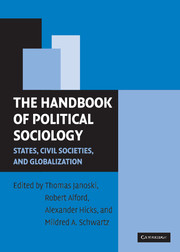Book contents
- Frontmatter
- Contents
- Preface
- Contributors
- Political Sociology in the New Millenium
- PART I THEORIES OF POLITICAL SOCIOLOGY
- 1 Rulemaking, Rulebreaking, and Power
- 2 Neopluralism and Neofunctionalism in Political Sociology
- 3 Conflict Theories in Political Sociology
- 4 Institutionalist and State-Centric Theories of Political Sociology
- 5 Culture, Knowledge, and Politics
- 6 Feminist Theorizing and Feminisms in Political Sociology
- 7 The Linguistic Turn: Foucault, Laclau, Mouffe, and Žižek
- 8 Rational-Choice Theories in Political Sociology
- 9 Theories of Race and the State
- PART II CIVIL SOCIETY: THE ROOTS AND PROCESSES OF POLITICAL ACTION
- PART III THE STATE AND ITS MANIFESTATIONS
- PART IV STATE POLICY AND INNOVATIONS
- PART V GLOBALIZATION AND POLITICAL SOCIOLOGY
- References
- Name Index
- Subject Index
5 - Culture, Knowledge, and Politics
Published online by Cambridge University Press: 05 June 2012
- Frontmatter
- Contents
- Preface
- Contributors
- Political Sociology in the New Millenium
- PART I THEORIES OF POLITICAL SOCIOLOGY
- 1 Rulemaking, Rulebreaking, and Power
- 2 Neopluralism and Neofunctionalism in Political Sociology
- 3 Conflict Theories in Political Sociology
- 4 Institutionalist and State-Centric Theories of Political Sociology
- 5 Culture, Knowledge, and Politics
- 6 Feminist Theorizing and Feminisms in Political Sociology
- 7 The Linguistic Turn: Foucault, Laclau, Mouffe, and Žižek
- 8 Rational-Choice Theories in Political Sociology
- 9 Theories of Race and the State
- PART II CIVIL SOCIETY: THE ROOTS AND PROCESSES OF POLITICAL ACTION
- PART III THE STATE AND ITS MANIFESTATIONS
- PART IV STATE POLICY AND INNOVATIONS
- PART V GLOBALIZATION AND POLITICAL SOCIOLOGY
- References
- Name Index
- Subject Index
Summary
In the last thirty years, culture has been taken more seriously as an analytic tool and used more extensively than ever before in the social sciences. A generation of scholars has now demonstrated the cultural dimensions of all political institutions and processes. At the same time, they have shown the political side of all culture, from childrearing to insane asylums, television shows to presidential inaugurations, architecture to the gardens of Versailles, fairy tales to high fashion. Across many disciplines, the study of culture today is about the power of gatekeepers, the rhetorical legitimation of formal organizations, the social determinants of art and ideas, the reproduction of hierarchies, the acquisition of cultural capital, the normalization of the individual self. To show that an idea or institution is socially constructed – one of today's great intellectual pastimes – is normally to reveal the political purposes hidden behind it (Hacking, 1999).
Political sociology should be riding high thanks to the “cultural revolution,” as culture and politics have become central, intertwined lenses for viewing all social life. But I suspect the opposite has happened. Rather than defining its domain as the exercise of power, the clash of wills, the construction of favorable ideas and institutions, wherever it happens – in other words, making politics, like culture, a way of seeing the world – political sociology has defined its terrain more narrowly as the institutions of the nation-state: parties and elections, citizenship and boundaries, state agencies and their constituencies.
- Type
- Chapter
- Information
- The Handbook of Political SociologyStates, Civil Societies, and Globalization, pp. 115 - 134Publisher: Cambridge University PressPrint publication year: 2003



